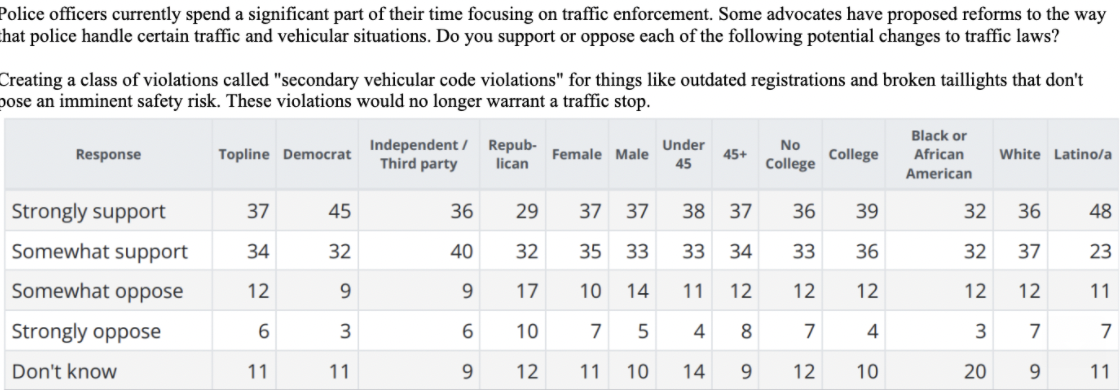NEW POLL: Voters Support Banning Traffic Stops For Broken Tail Lights
Earlier this month, Philadelphia became the first major city in the United States to ban traffic stops for minor infractions such as outdated registrations, broken tail lights, or bumper issues.
The legislation, dubbed the Driver Equality Act, has three aims:
To take a small step in the right direction towards prioritizing limited law enforcement resources away from minor infractions and towards more crucial police work such as solving serious crimes like shootings and murder.
To reduce the risk of injury or death for both police officers and civilians. As Councilmember Isaiah Thomas put the point: “Traffic stops are traumatic for drivers and scary for police officers. Limiting them makes everyone safer…”
To counteract extreme racial disparities in the city’s traffic stops.
Danielle Outlaw, Philadelphia’s Police Commissioner, supported the legislation, which the city council passed with a lopsided 14-2 vote.
To determine whether this type of change to existing traffic laws is as popular with voters across the country as it is with Philadelphia’s elected leaders, Safer Cities conducted a survey of likely voters nationally. We also provided likely voters with the various rationales that undergird the Driver Equality Act, and then asked how convincing, if at all, voters found each of the rationales.
Our survey of 1,135 web panel respondents was conducted on the Data for Progress infrastructure. The sample was weighted to be representative of likely voters by age, gender, education, race, and voting history. The survey was conducted in English. The margin of error is ±3 percentage points.
KEY FINDINGS:
71% of likely voters support changing traffic laws so that certain violations, such as broken tail lights, outdated registrations, and other infractions that pose no imminent safety risk, do not result in traffic stops. (Net support = +53)
74% of likely voters found convincing the rationale that reducing the number of traffic stops that police make would allow police to focus more of their time on solving serious crimes like murder and rape. (Net convincing = +55)
62% of likely voters found convincing the rationale that reducing the number of traffic stops police make would reduce the number of police officers killed during minor traffic stops. (Net convincing = +35)
59% of likely voters found convincing the rationale that that reducing the number of traffic stops police make would reduce the number of civilians killed by police officers during minor traffic stops. (Net convincing = +26)
56% of likely voters found convincing the rationale that reducing the number of traffic stops police make would reduce racial disparities in traffic stops. (Net convincing = +22)
CONCLUSION:
City leaders across the country should seriously consider following in Philadelphia’s footsteps.
Mailing a traffic ticket to a person with an expired registration instead of giving the police the power to make a traffic stop is deeply popular across partisanship, race, gender, and educational attainment.
Importantly, this is a policy likely to be popular in both Republican and Democratic leaning jurisdictions. That’s especially true when the policy is linked to the need to free up law enforcement resources to focus instead on solving serious crimes like shootings and murders.





